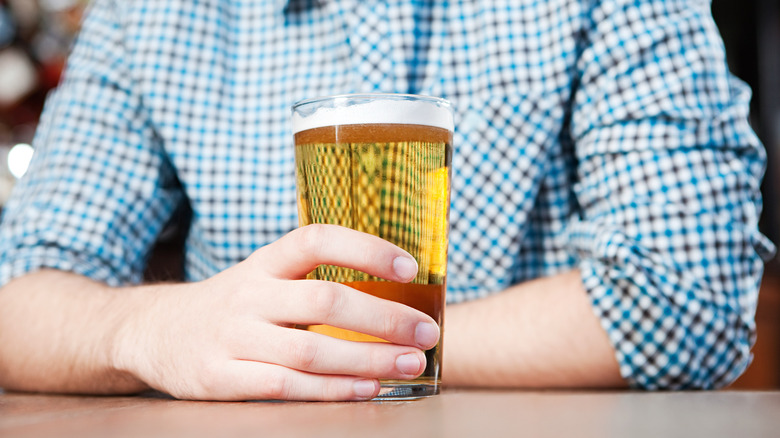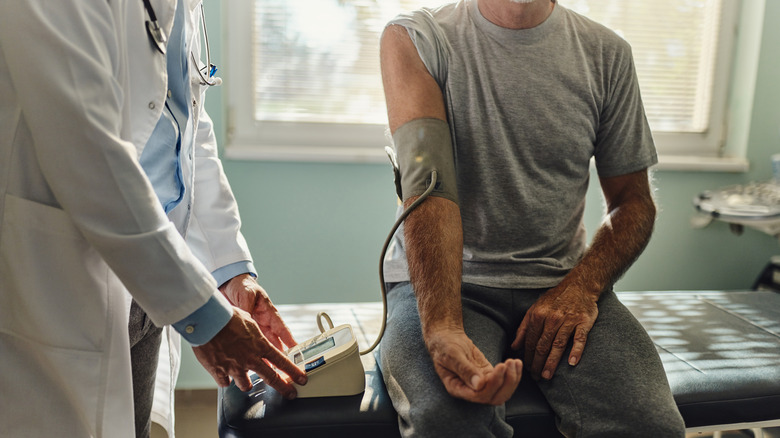Can Drinking Too Much Alcohol Cause A Heart Attack?
Most of us are well aware that cardiovascular disease (CVD) is the leading cause of death in the United States and around the world. Astonishingly, CVD deaths have risen from 12.1 million in 1990 to 20.5 million in 2021, as described in a 2023 report by the World Heart Federation (WHF). Globally, 80% of CVD-related deaths occur in countries that are low- to middle-income.
A heart attack can be triggered by plaque buildup in the coronary arteries that prevents the heart from receiving enough blood and oxygen, as explained by the American Heart Association (AHA). "Up to 80 per cent of premature heart attacks and strokes can be prevented," Professor Fausto Pinto, the former president of WHF, pointed out in a news release. Some common contributors to heart attacks include a sedentary lifestyle, consuming too much sodium, and smoking tobacco. Other risk factors, such as age and family history, are unpreventable. However, individuals with a genetic predisposition to heart attacks can minimize their risk by practicing a healthy lifestyle.
In order to accomplish that, those who enjoy alcohol but wish to avoid heart attacks may need to cut back on their alcohol consumption. When alcohol is consumed in excess, it can increase the risk of having a heart attack, according to the University of California San Francisco.
Drinking too much alcohol can increase blood pressure
Excessive alcohol consumption can create changes in the body that contribute to heart attacks. As described by Drinkaware, individuals with high blood pressure have a greater likelihood of experiencing a heart attack because the heart must exert more energy to pump blood. Blood pressure can rise when someone drinks alcohol, and it can stay high if someone drinks alcohol regularly. Alcohol consumption can also contribute to weight gain, which is another risk factor for high blood pressure, as noted by WebMD. A 2023 meta-analysis published in Hypertension found that regularly drinking alcohol was positively associated with higher systolic blood pressure when evaluating 7 studies.
The U.S. Food and Drug Administration (FDA) described high blood pressure in stages, with the first stage being a reading of 130/80. A reading of 140/90 or higher is considered stage 2. Someone who receives a reading of 180/110 or higher is in "hypertensive crisis," and should be treated immediately. High blood pressure doesn't typically present identifying symptoms, so it's critical to get your blood pressure checked by your doctor regularly. Pharmacies also sell blood pressure machines that you can use at your own convenience.
Along with increasing blood pressure, drinking alcohol in large amounts can strain your heart muscle. Regularly drinking alcohol damages the heart and can lead to alcoholic cardiomyopathy, a condition where the heart enlarges because it can't pump blood properly, as explained by Healthline. In some cases, alcoholic cardiomyopathy can lead to heart failure.
Drinking less alcohol decreases risk of heart attack
To prevent the overconsumption of alcohol, the National Institute on Alcohol Abuse and Alcoholism (NIAAA) created low-risk drinking guidelines for women and men, according to Alcohol Research Current Reviews. Women who want to engage in low-risk drinking can drink a maximum of 3 alcoholic beverages a day, and a maximum of 7 alcoholic beverages a week. The low-risk drinking threshold for men is a maximum of 4 alcoholic beverages a day and 14 alcoholic beverages in a week. Heavy drinking occurs when alcohol consumption exceeds the recommended amount.
Despite these guidelines, the 2023 study published in Hypertension suggested that a single alcoholic drink per day can be enough to raise someone's blood pressure. "There's no safe level of alcohol," Paul Whelton, one of the researchers involved in the study, told FOX13. "The more that you consume and the more that you regularly consume it, the more you're going to get a blood pressure effect." Dr. Marco Vinceti, the senior author of the study, recommends limiting or eliminating alcohol from your diet if you want to maintain a healthy blood pressure, as reported by the AHA.
The amount of alcohol you can drink, if any, should be discussed with your doctor if you have heart disease or a family history of heart attacks.



